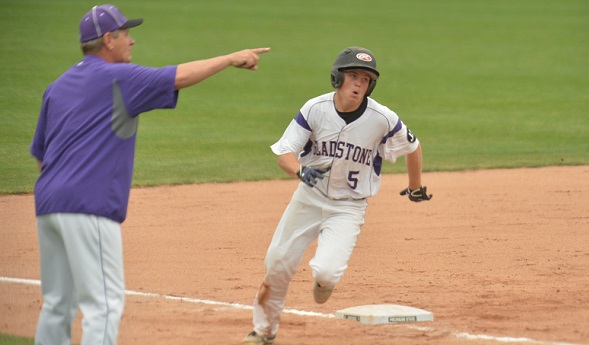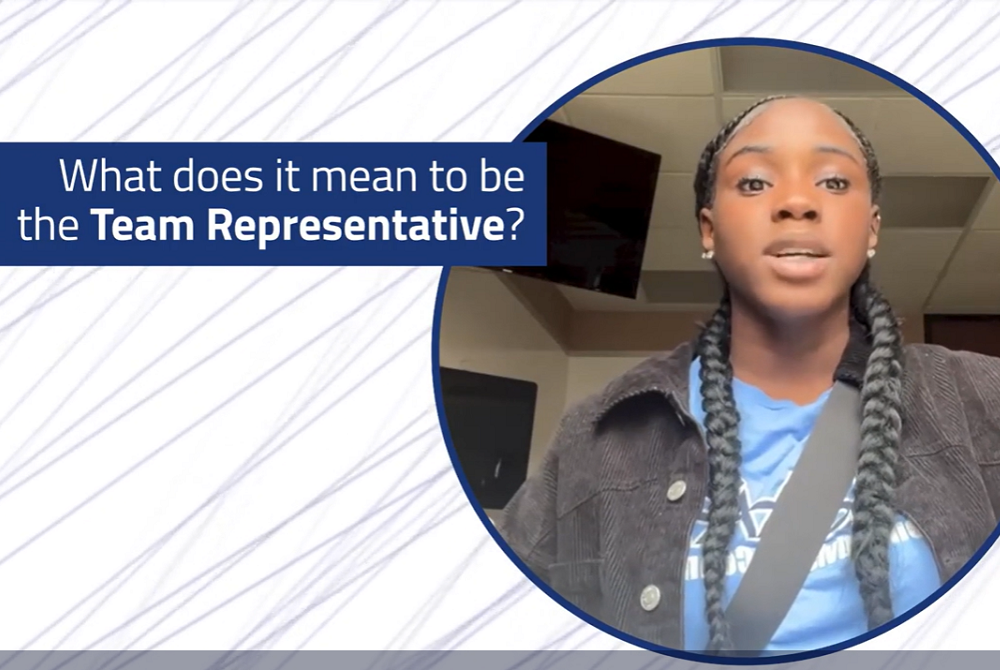
Despite Overall Dip, 8 Sports Add Athletes
July 8, 2015
By Geoff Kimmerly
Second Half editor
Eight high school sports for which postseason tournaments are sponsored by the Michigan High School Athletic Association enjoyed gains in participation during the 2014-15 school year. However, total participation in MHSAA sports decreased slightly for the fourth straight school year, following a continuing trend of declining member school enrollments.
A total of 282,623 participants took part in the 28 tournament sports offered by the MHSAA during the past year – a 1.95-percent decrease from the 2013-14 figure of 288,230. However, enrollments at member schools also decreased 1.24 percent from 2013-14 and have fallen 11.1 percent since the 2006-07 school year – while MHSAA participation has fallen only 9.7 percent during that time. This year’s dip was only slightly larger than the 1.9-percent decrease from 2012-13 to 2013-14.
Overall boys participation fell 1.5 percent from 2013-14 to 2014-15, while girls participation fell 2.6 percent. The overall MHSAA totals count students once for each sport in which they participate, meaning students who are multiple-sport athletes are counted more than once.
Girls lacrosse was the only MHSAA sport to set a participation record during 2014-15, with 2,589 athletes (an increase of 1.9 percent) this spring, and has set a participation record every season since becoming a sponsored tournament sport in 2005. However, boys lacrosse, which also became tournament sponsored in 2005, saw its first decrease in participation, falling 2.6 percent to 4,958 athletes despite five schools adding programs to bring that total to 130.
Baseball participation increased for the fourth straight school year, this season six tenths of a percent to 18,333 athletes. The other six sports that saw increased participation during 2014-15 all bounced back from decreases between 2012-13 and 2013-14. Boys bowling increased 4.2 percent to 3,724 athletes, its second-highest total as an MHSAA tournament sport. Both boys skiing (4.0 percent increase to 775 athletes) and girls skiing (1.4 percent to 671) also saw higher participation after two seasons of declines. Girls competitive cheer (1.0 percent to 7,189 athletes), girls gymnastics (3.0 percent to 618) and boys soccer (1.0 percent to 14,426) also saw bounce-back years after dips the school year before.
However, two of the most popular girls sports continued to experience downward trends. Girls basketball participation fell for the ninth straight season, to 15,702 athletes, the sport’s lowest total since records first were kept in 1991-92. The girls basketball total has decreased 18 percent since a U.S. District Court decision led to the switching of girls basketball season from fall to winter beginning in 2007-08. Comparatively, girls enrollment at MHSAA schools during that time has fallen 11.6 percent.
The sport that swapped seasons with girls basketball and moved to fall, volleyball, saw a 3.3-percent drop in participation this school year to 17,996 athletes, its fewest since 1991-92 and a decrease of 16.5 percent since its final season as a winter sport.
Also of note in this year’s survey:
- Total, eight sports saw increases in participation in 2014-15 (four boys, four girls), while 20 experienced decreases (10 boys, 10 girls).
- A recent drop in football participation, 11 and 8-player teams combined, has continued to slow, the total this season falling only 1.4 percent to 40,088 athletes. The drop from 2011-12 to 2012-13 was 3.7 percent, and the drop from 2012-13 to 2013-14 was two percent.
- Wrestling saw a decrease for the sixth straight year, this season to 9,475 participants, a 7.9-percent drop from 2013-14 with its lowest total since the collection of data began.
- Girls cross country, after five straight years of increases, fell back 4.1 percent, to 8,350 athletes, although that total still represented the third highest of the last seven seasons. The trend was identical for boys cross country, except this season’s total of 8,786 athletes was down only 1.1 percent from a year ago and the second-highest over the seven-season string.
- Swimming and diving saw the largest decrease among a pair of related sports; girls participation fell six percent to 4,938 athletes and boys fell 7.4 percent to 5,617 after both had experienced slight increases during the last three school years.
- Boys golf participation fell for the sixth straight season, to 6,533 athletes, its lowest since 1991-92.
The participation figures are gathered annually from MHSAA member schools to submit to the National Federation of State High School Associations for compiling of its national participation survey. Results of Michigan surveys from the 2000-01 school year to present may be viewed on the MHSAA Website – www.mhsaa.com – by clicking on Schools > Administrators > Sports Participation Listing.
The following chart shows participation figures for the 2014-15 school year from MHSAA member schools for sports in which the Association sponsors a postseason tournament:
BOYS GIRLS
SPORT |
SCHOOLS (A) |
PARTICIPANTS |
SCHOOLS (A) |
PARTICIPANTS (B) |
|
Baseball |
639/650/6 |
18,325 |
- |
-/8 |
|
Basketball |
726/733/5 |
21,401 |
665/726 |
15,702/14 |
|
Bowling |
355/371/9 |
3,711 |
339/366 |
2,970/13 |
|
Competitive Cheer |
- |
- |
335/348 |
7,189 |
|
Cross Country |
605/639/0 |
8,786 |
587/637 |
8,350/0 |
|
Football – 11 player |
597/621/59 |
39,338 |
- |
-/65 |
|
8-player |
33/38/0 |
685 |
- |
- |
|
Golf |
503/532/46 |
6,460 |
325/331 |
3,334/73 |
|
Gymnastics |
- |
- |
66/75 |
618 |
|
Ice Hockey |
232/269/11 |
3,448 |
- |
-/15 |
|
Lacrosse |
130/137/3 |
4,955 |
88/91 |
2,589/3 |
|
Skiing |
87/100/0 |
775 |
90/98 |
671/0 |
|
Soccer |
466/495/16 |
14,370 |
459/479 |
13,333/56 |
|
Softball |
- |
- |
570/635 |
13,113 |
|
Swimming & Diving |
233/264/3 |
4,935 |
256/275 |
5,617/3 |
|
Tennis |
299/316/6 |
6,294 |
335/345 |
8,628/11 |
|
Track & Field |
661/684/0 |
22,439 |
645/681 |
16,855/0 |
|
Volleyball |

MHSAA, NFHS Learning Center Team Up to Provide Online Student Leadership Series
By
Geoff Kimmerly
MHSAA.com senior editor
August 10, 2023
Leadership always has been one of the most valuable and applicable life skills developed by student-athletes participating in educational athletics. To assist in that development, the Michigan High School Athletic Association (MHSAA) and National Federation of State High School Associations (NFHS) have partnered to produce an online Student Leadership series designed to provide the latest research-based instruction to high schoolers throughout the United States.
The Student Leadership series is provided as part of the web-based NFHS Learning Center and includes two free courses focused on students – “Becoming a Leader” and “Leading Others” – with a third installment for coaches currently in production. All three are inspired by the latest research on how youth-aged athletes learn to lead.
This latest work builds on the MHSAA-produced “Captains Course” developed in 2015 with Michigan State University’s Institute for the Study of Youth Sports (ISYS). The “Captains Course” has been taken more than 100,000 times and is based on in-person “Captains Clinics” that MHSAA staff and ISYS conduct with thousands of students across Michigan each year.
Each student-focused segment of the new Student Leadership series takes 30-45 minutes to complete and includes frequent and quick activities designed to help students understand how they would apply leadership skills in real-life scenarios. Course instruction was created primarily in coordination with the MHSAA by a pair of nationally-recognized authorities on the subject: Jed Blanton, an assistant professor in kinesiology, recreation and sport studies at the University of Tennessee; and Scott Pierce, an associate professor in kinesiology and recreation at Illinois State University.
Both Blanton and Pierce have vast experience with youth athletics; both also formerly worked for the Institute for the Study of Youth Sports and served as graduate assistants at the MHSAA during their time at MSU, playing large roles in more than a decade of research conducted through coordination with the MHSAA’s 16-member Student Advisory Council. High school administrators, student leaders, and other researchers and mental performance consultants also contributed to the lessons taught in these courses. The NFHS produced the content, including all of the visuals and digital features, and the student-focused courses went live on the NFHS Learn website in mid-summer.
“We’ve taken a good program, and made it even better,” said MHSAA Assistant Director Andy Frushour, who coordinates the Association’s student services programs. “This is a program we do in person in Michigan, but our reach now is across the country – and these courses are free, hopefully allowing us to contribute to the development of even more student leaders.”
The “Becoming a Leader” course defines leadership styles and builds skills to help students consider themselves as leaders. “Leading Others” details how leaders put those skills into practice including during challenging situations. Blanton and Pierce worked closely with student advisory groups from various states to make the research content relatable to school sports participants. All voices heard in the courses belong to high school students – including athletes from Michigan, Illinois and Washington who provided 30 testimonials that describe leadership in action.
The “Coaches Course” will provide the same information as presented to high school students, but in a way that explains how coaches can use these tools to personalize leadership training among their athletes as they seek to recognize which types of leaders they have on a team, and which types are missing and need to be developed.
“The NFHS is grateful for the opportunity to work with the MHSAA as well as Dr. Blanton and Dr. Pierce,” said Dan Schuster, the NFHS’ director of educational services. “We believe these student leadership courses will provide valuable information across the country and will contribute to the improvement of the interscholastic experience for young people.”
Video previews provide additional information on both Student Leadership courses.Click for direct links to “Becoming a Leader" and “Leading Others.”

